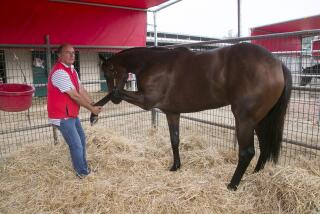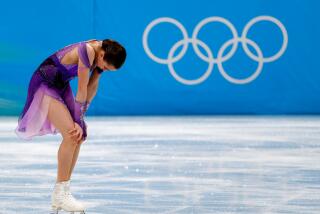A Tour winner admits doping
- Share via
Danish hero Bjarne Riis on Friday became the first Tour de France champion to admit that he used performance-enhancing drugs to win cycling’s most prestigious race, a development that prompted mixed reactions from the sport’s insiders.
The confession was lamented by some as the latest significant punch in a series of hits to the sport’s credibility, but greeted by others as evidence of healing and hope.
Riis’ comments -- “I have taken doping. I have taken EPO,” he said during a televised news conference from Copenhagen -- came two days after two of his 1996 Tour de France teammates also admitted illegal doping. They also come as Floyd Landis, the 2006 Tour winner, and Ivan Basso, last year’s Giro d’Italia winner, and others are being scrutinized as possible cheaters.
But while Tour de France director Christian Prudhomme railed to the Associated Press that Riis had “soiled the yellow jersey,” USA Cycling director Sean Petty took the contrasting view that while “it’s difficult to continue reading and hearing news like this ... this is a real cleansing that’s going on.”
Petty’s opinion was seconded by Greg LeMond, a three-time Tour champion who has publicly accused both Landis and cycling superstar Lance Armstrong, a seven-time Tour champion, of cheating.
“I never thought I’d see the day that this would happen,” LeMond said in a statement released by his attorney. “Mr. Riis’ decision is courageous and I hope other cyclists will follow suit.”
Agreeing with both was cycling commentator Frankie Andreu, a former Armstrong teammate who confessed last fall that during his career he had used EPO, or erythropoietin, a synthetic hormone that stimulates the production of oxygen-carrying blood cells.
“Some of the same riders, like Bjarne, who are making these admissions are the same people who are taking aggressive steps to make sure the floor is clean now,” Andreu said. “Some of these riders, myself included, back in the 1990s, we saw things get out of control. It was no fun to be in the situation and many of us chose the wrong option.
“Now, with some sponsors leaving and all the publicity, there is a bit of a cascading effect. I think Bjarne wants to make sure current riders don’t make the mistakes we did.”
Riis is currently director of one of cycling’s top teams, CSC, which is sponsored by an El Segundo-based computer sciences company that earlier this year initiated a stringent new drug-testing program for its riders.
CSC issued a statement saying it was “deeply concerned by the revelations,” but that no decision had been made as to whether Riis would retain his post.
Riis said he hoped to remain with the team. He also said the yellow jersey from his Tour championship was at home in Denmark in a cardboard box. “They are welcome to come and get it,” Riis said. “I have my memories for myself.”
The riders who finished immediately behind Riis in the 1996 Tour have also been linked to doping. The runner-up, German star Jan Ullrich, retired from cycling after he was connected to last summer’s Spanish “Operacion Puerto” doping investigation. France’s Richard Virenque, the third-place finisher, served a suspension for his involvement in a 1998 doping scandal dubbed the “Festina Affair.”
“Operation Puerto” is an ongoing investigation by the Spanish government into the behavior of Eufemiano Fuentes, who is accused of administering various performance-enhancing drugs to more than 200 athletes, including several cyclists. The “Festina Affair” began when a Festina team trainer was found at the French border with his car trunk filled with illegal doping products.
Riis’ confession came on the same day that the Italian Olympic Committee recommended Basso be banned from cycling for 21 months for his involvement with Fuentes in the Spanish case. The rider was suspended by the Italian cycling federation last week after acknowledging that he had “attempted doping.” Basso admitted sending his blood to Fuentes but said he didn’t go through with the rest of the process.
Also this week, Landis participated in an arbitration hearing at which he disputed his positive test for synthetic testosterone during a key stage of his 2006 Tour win.
Jonathan Vaughters, coach of the fledgling U.S.-based Team Slipstream, predicted that the latest spate of doping investigations and confessions would have long-lasting impact.
From a competition site in Spain, Vaughters e-mailed to say that whereas the Festina Affair, which mostly involved one team, was a “shot over the bow,” these more recent developments indicate “a much larger and far-reaching scandal.”
“It shows that doping was not limited to a few people,” Vaughters wrote. “It has put a much, much greater pressure on the sport to change than Festina ever did.”
Vaughters said that while the immediate publicity may tarnish the sport and cloud its biggest event -- the Tour de France, which begins July 7 in London -- he believes this year’s Tour “will be the cleanest it’s ever been.”
He also suggested offering amnesty to riders who confess past doping transgressions.
“You have to remember, blood doping or EPO gives an advantage of 5-10%,” he said. “In a world where less than .001% wins races, if one person uses such a blood doping product, the rest are forced to do the same or be guaranteed to lose. No one is guilty here, except modern biochemical science. Not one cyclist feels good about this.
“I think the truth needs to be told. The tests are so much better now ... and the attitude is very different these days. Going forward there is hope, but it would be good to clear the past, once and for all.”
Vaughters said that already he is seeing positive signs that doping has decreased.
“I have a 20-year-old kid that just finished 21st in a hard mountain stage [at the Vuelta Catalunya], three minutes down from the leader,” Vaughters said. “A decade ago, a young, clean rider like that couldn’t finish in the top 150, so from a very inside perspective, all of these confessions and scandals have changed racing and changed it for the better.
“Behind the scenes, things are getting much better. But in the headlines they are grim.”
*
(BEGIN TEXT OF INFOBOX)
Wheels coming off
--
A tough week for cycling:
* Arbitration hearing on doping allegations against 2006 Tour winner Floyd Landis wraps up in Malibu.
* Three riders from the former Telekom team admit to using illegal substances during the 1990s.
* Bjarne Riis, Tour de France winner in 1996, admits using EPO during the race.
* Italian Olympic Committee calls for 21-month ban for 2006 Giro d’Italia champion Ivan Basso, who has been linked to a doping scandal.
More to Read
Go beyond the scoreboard
Get the latest on L.A.'s teams in the daily Sports Report newsletter.
You may occasionally receive promotional content from the Los Angeles Times.










